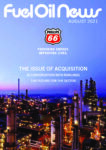With this issue considering the future shape of the industry and focusing on the topic of acquisition activity in the sector, we revisit the Prax Group which successfully acquired the Lindsey Oil Refinery in March of this year. Headquartered in London, this British multinational independent oil refining, trading, storage, distribution and retail conglomerate has gained a well-deserved reputation of excellence through its ability to deliver innovative customer solutions across the world and is committed to maintaining this. Forward-thinking in its approach, the group’s success over the course of the past two decades has been achieved through its entrepreneurial spirit, dynamic team and lean structure. With a stated aim of being best in class in every aspect of its business we spoke with John Regan to get an update on the long-term strategy of this leading presence in the global oil market.
Ensuring supply needs are met
In order to continue to meet its stated commitment to excellence, and to ensure that the supply needs of its customers can be met both now and in the future, in March of this year the Prax Group successfully acquired Lindsey Oil Refinery, located five miles from the Humber Estuary in North Killingholme, along with its associated logistic assets. The acquisition will bring new investment to the refinery and underlines the Prax Group’s determination to support the local economy and the wider community.
The Prax Group’s long-term strategy is to be fully integrated across the oil value chain from upstream to downstream. Acquiring the refinery and its associated assets was a natural progression for the Group, as it provides the opportunity to integrate the refinery and its associated product flows into the company’s UK distribution and retail footprint, which operates under the Harvest Energy brand. This will create unique opportunities for synergies with existing Prax-owned assets, as well as demonstrating an ongoing commitment to building a reliable and secure supply chain to meet the needs of its customers for many years to come.
To oversee operations on site, the Prax Group appointed Luc Smets as general manager of the refinery. Luc confirmed that the acquisition “provides an opportunity to close a gap in the supply chain,” which is achieved due to the fact that, “the Prax Group has control of the refinery’s oil products output, trading, and logistics — with the Finaline pipeline, rail loading, truck loading, and terminals.”
A nimble response to customer needs
Logistics is a key factor in terms of how the refinery will operate going forwards. “Our logistics assets are very attractive,” commented John Regan, sales director. “In some ways, they are as important as the refinery’s production capacity. We are able to move products at a very low cost in every direction — to Grangemouth, Jarrow or London, for example. These assets include the Finaline pipeline and shares in the Buncefield oil depot, which are crucial to deliver jet fuel to Heathrow, but also other products to the Greater London area. The Group’s structure means that it is both flexible and nimble, so we can move quickly to respond to any opportunities as they arise.”
This includes being responsive to the individual needs of their customers. “At the Prax Group, we are resolutely service-orientated, and we really value relationships,” John explained. “Our focus is always our customers, whoever and wherever they may be. Some distributors may wish to pick up product by rail and ship, rather than road, and the refinery can accommodate all these requirements. Prax Lindsey Oil Refinery will play a substantial role in the Prax UK supply chain, in line with the company’s vision to become an integrated global oil conglomerate.”
Despite its globally connected infrastructure and worldwide operations, the Prax Group remains committed to its home-grown ventures, as demonstrated by the recent announcement of significant investment into its Jarrow Terminal, located in the north east of the UK, with funds spread across several projects on the site; some of which are upgrade works, and some of which are to support new business.
Investing in future readiness
The announcement was a timely one, as the team recently celebrated five years of Prax operations at the facility. Having first acquired Jarrow Terminal on 29th February 2016, the site operations team received their first rail import on 8th May of that same year, an astounding accomplishment at the time. The Prax Group is now in the process of acquiring the freehold for the whole site, giving it full ownership of the terminal. Put simply, the Group recognises the value of the Terminal in terms of its importance to the UK’s national infrastructure, and its key role in securing and supplying energy for its customers, both locally and nationally.
The long-term plan is to make Jarrow a strategic hub, to increase throughputs – which is great news for the terminal’s many customers, as this will ensure security of supply going forwards. The plan is for the terminal to be able to throughput five products: super unleaded gasoline, premium unleaded gasoline, gasoil, diesel and kerosene. The Prax terminals team, headed up by the Group’s head of terminals, Adam Smith, is managing Jarrow’s investment projects in-house. The entire team has been involved in the project consultation and background decision-making process, which not only gives them full control of all projects, but also ensures that improvements are being made directly as a result of on-the-ground feedback. More importantly, however, it ensures that the team can continue to run operations at the terminal without any service disruption.
This is all to the benefit of the terminal’s wide customer base, guaranteeing continuity and security of supply, whilst enabling Jarrow Terminal to meet the demands of the market, ensuring that the business is prepared for the ever-changing future of the industry.
